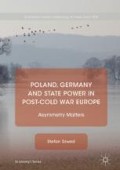Abstract
The Conclusion summarises the book’s main argument and findings with regard to the role of the three types of asymmetries—material, spatial and temporal—in structuring Poland and Germany’s conflicting interests, dissimilar policy choices and ultimately also the varying levels of their respective influence over bargaining outcomes in the area of high politics during the 2000s. Consideration is also given to the way in which the three structural asymmetries ‘mix’ to stimulate specific and sometimes less visible, but hence often more profound differences that had regularly tested the Polish-German relationship inside Euro-Atlantic institutions. The discussion subsequently extends beyond the second post-Cold War decade to take stock of more recent developments and present-day challenges, including the multiple dilemmas that beset the European project: the Eurozone (design) crisis, war in eastern Ukraine, influx of refugees from across the Mediterranean and, last but not least, Poland’s democratic backsliding. In the end, the chapter proposes an agenda for future conceptual and empirical research.
Access this chapter
Tax calculation will be finalised at checkout
Purchases are for personal use only
Notes
- 1.
Wolff-Powęska, Anna, and Dieter Bingen, eds. 2004. Polacy-Niemcy. Sąsiedztwo z dystansu. Poznań: Instytut Zachodni.
- 2.
Hirschman, Albert O. (1970) Exit, Voice and Loyalty. Responses to Decline in Firms, Organizations and States. Cambridge, MA: HUP
- 3.
Bachmann, Klaus (1994a) “Die Versöhnung muss von Polen ausgehen”, Die Tageszeitung, 5 August.
- 4.
Szczerbiak, Aleks (2009) Poland within the European Union: New Awkward Partner or New Heart of Europe? London: Routledge.
- 5.
Kundnani, Hans (2014) The paradox of German power, London: Hurst.
- 6.
In his speech, Sikorski stated: ‘I will probably be the first Polish foreign minister in history to say this, but here it is. I fear German power less than I am beginning to fear its inactivity. You have become Europe’s indispensable nation. You may not fail to lead.’ Sikorski, Radek (2011) “I Fear Germany’s Power Less Than her Inactivity”, Financial Times, 28 November.
- 7.
PiS did not support the former Premier Donald Tusk’s candidacy for a second term as President of the European Council. See Rankin, Jennifer (2017) “Poland reacts with fury to re-election of Donald Tusk”, The Guardian, 9 March.
- 8.
In August 2017, Chancellor Merkel called the planned judicial reforms in Poland ‘a serious issue, because the requirements for cooperation within the European Union are the principles of the rule of law. However much I want to have very good relations with Poland, we cannot simply hold our tongues and not say anything for the sake of peace and quiet.’ See Rankin, Jennifer (2017) “Angela Merkel: we cannot hold our tongues on risk to rule of law in Poland”, The Guardian, 29 August.
- 9.
In November 2017, PiS leader Jarosław Kaczyński justified Poland’s reparation claims in the following way: ‘The French were paid, Jews were paid, many other nations were paid for the losses they suffered during World War II. Poles were not. It is not only about material funds. It is about our status, our honour.’ See The New York Times (2017) “German War Reparations ‘Matter of Honor’ for Poland”, 11 November.
Author information
Authors and Affiliations
Copyright information
© 2019 The Author(s)
About this chapter
Cite this chapter
Szwed, S. (2019). Conclusion. In: Poland, Germany and State Power in Post-Cold War Europe. St Antony's Series. Palgrave Macmillan, London. https://doi.org/10.1057/978-1-349-95352-3_7
Download citation
DOI: https://doi.org/10.1057/978-1-349-95352-3_7
Published:
Publisher Name: Palgrave Macmillan, London
Print ISBN: 978-1-349-95351-6
Online ISBN: 978-1-349-95352-3
eBook Packages: Political Science and International StudiesPolitical Science and International Studies (R0)

